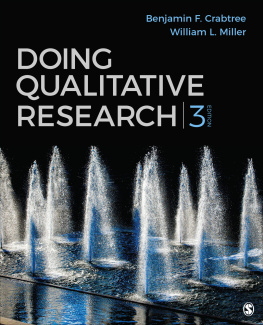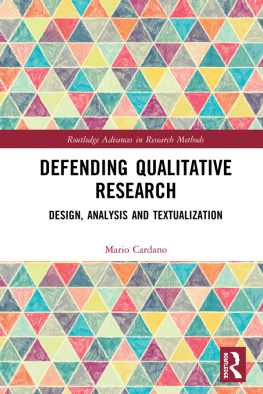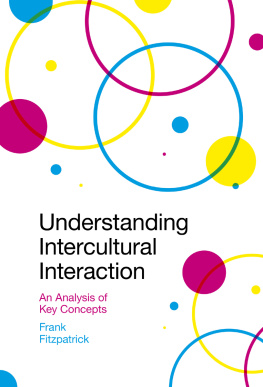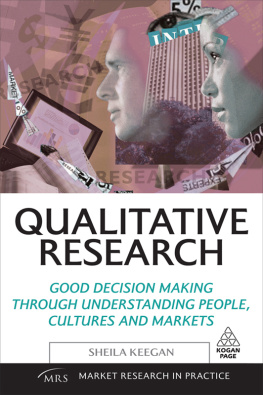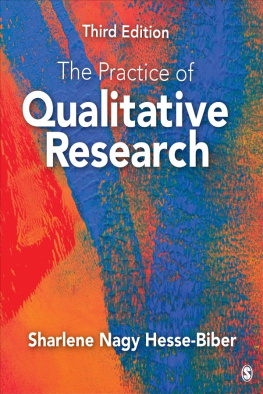
Qualitative Research and Intercultural Understanding
Qualitative Research and Intercultural Understanding: Conducting Qualitative Research in Multicultural Settings makes an important contribution to the fields of multiculturalism and qualitative research methods.
The first section of the book is a textbook on qualitative methodology. Beginning with a sketch of the historical roots of qualitative research and its place in the research landscape, the book then explores the notion of culture and our individual and collective experiences of culture. The chapters that follow explain how to frame a study and ask qualitative research questions, how to strengthen the trustworthiness of qualitative findings and how to collect and analyze data and write a research report. This section closes with a chapter on research ethics.
Every chapter is infused with the idea of researcher reflectivity in order to see beyond the researchers personal cultural worldview. Examples of research studies are provided in every chapter, and each chapter concludes with questions and exercises for critical thought. The second section of the book is comprised of five contributed chapters in which researchers describe their own challenges in conducting research in multicultural settings. Graduate students, experienced researchers and all those interested in multiculturalism will find something to learn and enjoy in this vivid and unusual book.
Deborah Court is associate professor in the School of Education at Bar-Ilan University in Israel. She has conducted qualitative research into culture, religious education and educational cultures in Israel and in Canada for 30 years.
Qualitative Research and Intercultural Understanding
Conducting Qualitative Research in Multicultural Settings
Deborah Court
With Chapters by Randa Abbas, Ted Riecken, Jack Seymour and Mai-Anh Le Tran
First published 2018
by Routledge
2 Park Square, Milton Park, Abingdon, Oxon OX14 4RN
and by Routledge
711 Third Avenue, New York, NY 10017
Routledge is an imprint of the Taylor & Francis Group, an informa business
2018 editorial material and , Mai-Anh Le Tran
The right of respective chapter authors to be identified as author of their chapter has been asserted by them in accordance with sections 77 and 78 of the Copyright, Designs and Patents Act 1988
All rights reserved. No part of this book may be reprinted or reproduced or utilised in any form or by any electronic, mechanical, or other means, now known or hereafter invented, including photocopying and recording, or in any information storage or retrieval system, without permission in writing from the publishers.
Trademark notice : Product or corporate names may be trademarks or registered trademarks, and are used only for identification and explanation without intent to infringe.
British Library Cataloguing-in-Publication Data
A catalogue record for this book is available from the British Library
Library of Congress Cataloging-in-Publication Data
A catalog record for this book has been requested
ISBN: 978-1-138-08008-9 (hbk)
ISBN: 978-1-138-08009-6 (pbk)
ISBN: 978-1-315-11368-5 (ebk)
Typeset in Bembo
by Apex CoVantage, LLC
This book is dedicated to the many hundreds of students who have studied in my qualitative research classes over the years, and to the dozens whose masters and doctoral studies I have supervised. Your questions, ideas, challenges, puzzles, arguments, hard work, perseverance, innovation, excitement and insights have taught me so much. You are everywhere in this book, which would not exist without you. Thank you, each and every one.
Contents
Randa Abbas
Deborah Court
Ted Riecken
Jack Seymour
Mai-Anh Le Tran
Deborah Court is associate professor in the School of Education at Bar-Ilan University in Israel. She has conducted qualitative research into culture, religious education and educational cultures in Israel and in Canada for 30 years.
Randa Abbas is Dean of Academic Studies in the Academic Arab College of Education in Haifa, Israel, and a lecturer in the Department of Education at Western Galilee College. Her research interests include education in a multicultural society, educational leadership, generational gaps in traditional societies, female leadership and higher education.
Ted Riecken is a professor in the Department of Curriculum and Instruction in the Faculty of Education at the University of Victoria in Canada. His research interests include educational change and innovation, Indigenous education and the role of culture in system transformation.
Jack Seymour is Professor Emeritus of religious education at Garrett-Evangelical Theological Seminary in Evanston, Illinois, USA. He was editor of the journal Religious Education for 11 years. Among his research interests are interfaith education and the empowerment of people in their religious lives.
Mai-Anh Le Tran is associate professor of religious education and practical theology at Garrett-Evangelical Theological Seminary in Evanston, Illinois, USA. The focus of her research and writing is local/global intersections of race, gender and class in religious identity formation and practices.
Why qualitative research and intercultural understanding?
The word research finds its origins in the Middle French of 500 years ago: recerche is the act of searching closely (www.etymonline). What a wonderful way to look at research! This idea calls up images of searching a persons face in order to understand his or her emotions, of searching under rocks and bushes for a lost or hidden object, of examining multiple clues to find patterns and solve a mystery, or of searching a text through repeated reading for hidden meaning. And while research came to mean systematic, disciplined inquiry into a question or problem (how much drier that sounds, but how important it is), research at its best has never lost the all-encompassing excitement and mystery of searching closely.
Qualitative research fits this idea very well. In a social group or culture peoples lives, histories, values, religious beliefs, behaviors and stories are woven into complex human tapestries. In order to understand people and their cultures we need to search closely into the interconnected qualities of peoples lives in their social and cultural milieux. There are systematic ways to do this, with many challenges and pitfalls along the way, and ongoing requirements of the researcher for self-criticism, reflection, flexibility, discipline and patience. In qualitative research the researcher is a research participant no less than those whom s/he is studying. Qualitative researchers collect and analyze data through the lens of who they are. Their research journey involves both utilizing and seeing beyond their experiences, knowledge bases and values in order to arrive at understanding of the lives of the research participants. The researchers personal make-up is at least partially tacit, as is the make-up of each research participant. Our culture is like our metaphorical body: we can see our hands and feet; looking in a mirror we can see our faces, but we cannot see the blood coursing through our veins, our hearts beating and all the various parts of us working together. Stepping inside participants worlds requires a patient dance between objectivity and subjectivity; insight and understanding come from what Michael Polanyi (1958, 87) described as the process by which the tacit co-operates with the explicit, the personal with the formal.




